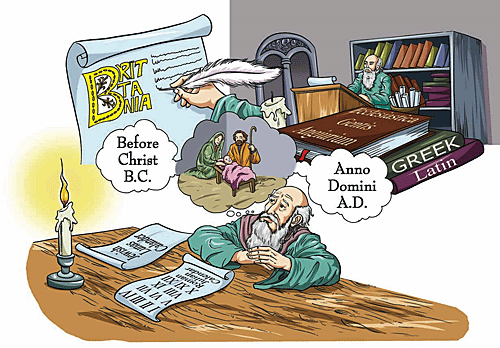English and Its Historical Development, Part 12
(the Venerable Bede made important contributions to the English language via Latin)
in A.D. 731, the Venerable Bede, a monk at Jarrow, wrote a very important work called the Ecclesiastical History of the English People . . . in Latin
Bede made Latin an important part of learning in England by writing about grammar, poetry, astronomy, Greek and Latin literature, arithmetic, and Biblical exegesis. All of the subjects were written in Latin.

The achievements of the Northumbrian renaissance lay in many fields
Although the achievements of the Northumbrian revival lay in many fields; such as, art, architecture, poetry, paleography, and manuscript illuminations, the supreme achievement of the age was the scholarship of the Venerable Bede (673-735).
In the writings of Bede, particularly his History of the English Church and People, the intellectual tradition of Western Europe attained a level unequaled since the fall of Rome; and it remains to this day our principal source of knowledge of Anglo-Saxon England in those dim and distant times.
Bede was a product of the Roman-Benedictine tradition and he spent his life under the Benedictine rule at Jarrow, where he was an outstanding monk, or someone who was worthy of being imitated.
He was also a superb scholar whose investigations profited enormously from the fine library that Benedict Biscop had installed in the monastery in 681. Bede regarded his theological writings as his most important work, but his fame in later centuries rests primarily on his writings about history.
Bede's broad historical vision and his sense of structure and unity, set his work apart from the dry annals and credulous saints' lives which typified the historical writing of his day.
It was Bede's purpose to narrate the miraculous rise of Christianity in Britain and its crucial role of imposing coherence and purpose on the chaos of human events.
In Bede's hands, the history of the British people and the Anglo-Saxons, and the rise of Christianity among them, acquired shape and direction.
Bede was one of the first to propose a calendar that would reckon the years backward and forward from the "birth of Christ"
English historian, theologian, and scientist; Bede is considered to have been the greatest master of chronology in the Middle Ages.
It is characteristic of this man who regarded Christianity as the supreme organizing force in history that he should be the first major historian to use the Christian era as his chronological base; that is, to date events not in terms of kings' reigns or lunar cycles, but in terms of Christ's birth. Bede is said to have taken the idea from a sixth-century scholar, the Roman monk Dionysius Exiguus.
So, it is that Bede's sense of chronology and historical development resulted in the division of history into the two eras, B.C. (before Christ) and A.D. (anno Domini, "in the year of our Lord").
Bede is also given credit for giving his contemporaries the concept of an "English People". At a time when England was divided into numerous individual kingdoms, and loyalties were limited to one's clan or local lord, Bede conceived the notion of a single English race and made it the subject of his history.
Proceed to Part 13, Vikings destroyed Britain.
INDEX or Table of Contents, English and its historical development.
References: sources of information.
